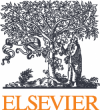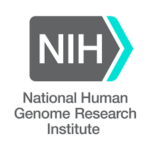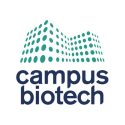G2MC 7th International Conference
Speakers
Keynote Speakers
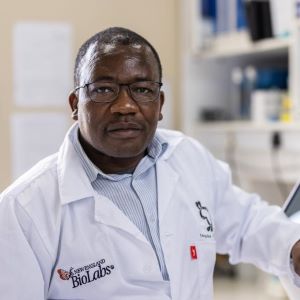
Prof. Collet Dandara, PhD
University of Cape Town, South Africa
Collet Dandara is a Professor of Human Genetics, Principal Investigator of the Pharmacogenomics and Drug Metabolism Research Group at the University of Cape Town. From the early days of his career, Professor Dandara’s research and publications focused on foundational studies in pharmacogenetics, and later pharmacogenomics, characterising genomes of African populations to identify genomic clues on differential drug responses observed in patients. His work has laid a firm basis on understanding the profile of genetic variants of pharmacogenomics importance in African populations, leading to novel discoveries as well as providing mechanistic understanding of the functional significance of such genetic variants and the networks they are involved in. The work by the Pharmacogenomics & Drug Metabolism Group has contributed to the understanding of the diversity of the genomes of African populations. Lately, cognisant of the wide use of traditional medicine, the group has started research on the pharmacogenomics of herbal medicines. Through his research, professor Dandara was nominated the Vice-Chair of the African Consortium of Pharmacogenomics (APC) in 2018; is a member of the African Society of Human Genetics (AfSHG); serves as a committee member of International Scientific Advisory Committee (ISAC) for the Human the Human Variome Project (HVP); is a member of the Global Genomic Medicine Collaboration (G2MC) Initiative and is on the working group of the Global Pharmacogenomics Network. Professor Dandara has authored more 140 publications in international journals and an H-index of 26 and an i10-index of 60. Professor Dandara serves on Editorial Boards of several international journals.
Professor Dandara is a recipient of the World Academy of Sciences (TWAS) Young Affiliate Award in 2012 and now sits on the Executive of TWAS Young Affiliate Network (TYAN). In 2014 Professor Dandara was a finalist in the South Africa National Science and Technology Forum (NSTF) Awards in the category of “Human Capacity Development”. He has supervised to graduation several MSc/PhD students. Professor Dandara serves in several University of Cape Town Committees including the Faculty of Health Sciences Transformation Committee of which he previously served as its Chairperson. He serves on the selection committee for the South African Young Academy of Sciences (SAYAS).
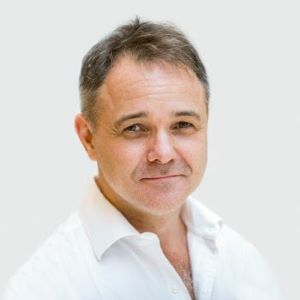
Jeremy Farrar, PhD
World Health Organization, Switzerland
As Chief Scientist, Jeremy Farrar oversees the work of the Science Division, bringing together experts and networks working in science and innovation from around the world to guide, develop and deliver high quality health policies and services to the people who need them most.
Prior to joining WHO, Dr Farrar was Director of the Wellcome Trust. In his 9 years there, he oversaw a series of major reforms, restructuring and growth, with Wellcome now collaborating with partners around the world and focused on fundamental discovery research and three challenge areas of: infectious diseases; climate and health; and mental health, all with a commitment to ensuring that equity, diversity and inclusion are central to the science they support.
Before joining Wellcome, Dr Farrar spent over 17 years as Director of the Clinical Research Unit at the Hospital for Tropical Diseases in Ho Chi Minh City in Viet Nam. His clinical and research interests have been in integrated health research across a range of infectious diseases and noncommunicable illness including emerging infections, influenza, infections of the brain, dengue, typhoid, malaria, tuberculosis, antimicrobial resistance, opportunistic infections related to HIV and stroke. Dr Farrar was the founding chair of WHO’s R&D Blueprint and the founding director of the International Severe Acute Respiratory and emerging Infection Consortium (ISARIC) that led on to the work of the RECOVERY Trial and the UK COVID-19 Genomics UK Consortium.
Dr Farrar trained in neurology and infectious diseases in London, Edinburgh and Oxford in the United Kingdom and in Melbourne in Australia. He has a PhD in Immunology from the University of Oxford in the United Kingdom in partnership with the University of California in San Francisco in the United States of America.

Sheri Schully, PhD
All of Us Research Program, National Institutes of Health, USA
Sheri Schully, Ph.D., is the deputy chief medical and scientific officer and the lead for ancillary studies in the All of Us Research Program at the National Institutes of Health. Through her leadership, she is establishing ancillary studies as a core and scalable capability of the program that will expand the cohort and deliver new phenotypic, lifestyle, environmental, and biological data to the All of Us Researcher Workbench. Dr. Schully has been involved with shaping the program and setting the scientific vision and strategy since its inception.
Prior to this role, she was a team lead and senior advisor for disease prevention in the Office of Disease Prevention (ODP). There, she led the effort to systematically monitor NIH investments in prevention research and assess the progress of that research. She also served as the team lead for the Knowledge Integration Team as well as a program officer in the Epidemiology and Genomics Research Program at the National Cancer Institute (NCI). She came to the NIH as an NCI-designated Presidential Management Fellow in 2005.
Dr. Schully’s research interests include genomics, personalized medicine, and the integration of genetic and genomic information into clinical and public health practices. Her work has been published in numerous high-impact scientific journals. She earned both a Ph.D. in biological sciences with a concentration in population genetics and a B.S. in zoology with a minor in chemistry from Louisiana State University.
2023 Conference Speakers
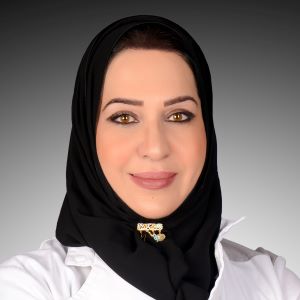
Ammira Al-Shabeeb Akil, EMBA, PhD
Sidra Medicine, State of Qatar
Dr. Al-Shabeeb Akil leading Sidra Medicine’s Genome 2 Cure (G2C) clinical research program, specializing in the study of genetic and metabolic diseases. Furthermore, she oversees the operations of the Precision Medicine of Diabetes Prevention lab at Sidra Medicine in Doha, Qatar, and holds the position of the lab’s Lead Principal Investigator. Dr. Al-Shabeeb Akil profound contributions to clinical genomic research, particularly in the domains of complex and also the rare diseases, are strengthened by her experience in population-based research, cohorts design and the development of screening initiatives. Her collaborative efforts extend to working closely with clinical and research colleagues at Sidra Medicine and Qatar Genome and Qatar biobank, as well as collaborating partners within Qatar and on an international scale.
Dr. Al-Shabeeb Akil plays a pivotal role in advancing the development of genomic sequencing programs for newborn screening in Qatar, with the primary objective of detecting and addressing treatable disorders encompassing both monogenic and polygenic diseases. Her work in this realm involves collaboration with distinguished experts from across the globe. Driven by innovation, her strategic approach seamlessly merges the application of cutting-edge research technology with a profound commitment to nurturing the research landscape in Qatar, all while maintaining a committed focus on precision medicine. Significantly, Dr. Al-Shabeeb Akil leads initiatives that utilize genomic sequencing and Polygenic Risk Scores for the screening of diseases of national significance starting with type 1 diabetes and rare forms of neonatal diabetes. Her pioneering research endeavors consistently attract significant attention and funding, cementing her position as a prominent in the fields of genomics and preventive precision medicine in the region.
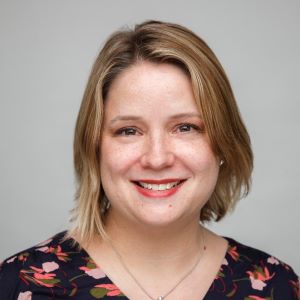
Michelle Bishop, PhD
Wellcome Connecting Science, United Kingdom
Dr Michelle Bishop is the Associate Director, Learning and Training at Wellcome Connecting Science where she leads a team of scientists, educationalists and event organisers. Together the team develops and delivers genomic education and training initiatives designed for a global professional audience, including healthcare professionals and researchers. Michelle has worked in the field of genetics and genomics education for 17 years. Her accomplishments include: authoring 40 genomics education resources and overseeing the development of 100 more; developing specialist training curricula for genomic specialists including genetic counsellors; defining competency frameworks in genomics for different professions on consenting for genomic tests and the return of genomic test results; teaching medical, dental, nursing, midwifery and healthcare science trainees; authoring 15+ peer-reviewed papers and two book chapters on genomics education; providing educational and clinical expertise to national and international projects. Michelle is a trained genetic counsellor and holds a PhD in genetics education.
Twitter: @mbishop_uk

Prof. Matt Brown, MBBS, MD
Genomics England, United Kingdom
Matt Brown is a clinician-scientist who trained initially in medicine and rheumatology in Sydney, Australia before completing a Doctorate of Medicine based at University of Oxford, focusing on genetics of ankylosing spondylitis. He was appointed Professor of Musculoskeletal Sciences at University of Oxford in 2004. In 2005 Matt returned to Australia, firstly to University of Queensland, and since 2016, at Queensland University of Technology, where he was Professor and Director of Genomics. In 2013 he was elected to Fellowship of the Australian Academy of Sciences in recognition for his achievements in genetics research. In 2019 he moved to King’s College London and Guy’s and St Thomas’ Hospitals NHS Trust to direct their NIHR Biomedical Research Centre, and in 2021 moved to the position of Chief Scientific Officer of Genomics England. He continues to work in genetics of human diseases, with a particular focus on common and rare bone and joint diseases, and in cancer genomics and personalized medicine. He continues to practice rheumatology, with a particular focus on spondyloarthritis.
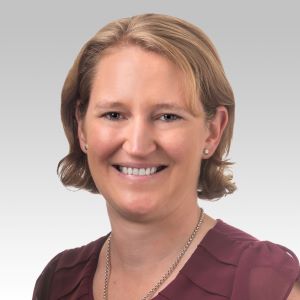
Gemma Carvill, PhD
Northwestern University, USA
Gemma Carvill is an Assistant Professor in the Department of Neurology at Northwestern University in Chicago, USA. She received her PhD at the University of Cape Town, South Africa, and completed her postdoc at the University of Washington, Seattle, USA. Her lab uses genomic technologies, machine learning and high-throughput functional assays to define the molecular basis of epilepsy, including coding and non-coding variants. Her group also uses patient-derived stem cell models to study how rare variants in genes involved in epigenetic mechanisms cause epilepsy. At Northwestern, Dr. Carvill co-directs the Adult Epilepsy Genetics Program with the goal of expanding neurogenetics research and facilitating genetic diagnoses for patients. She also works with colleagues in South Africa to develop strategies for increasing access to genetic testing, and building genetic epilepsy research in sub-Saharan Africa, to ensure that precision therapies benefit all individuals affected by epilepsy.
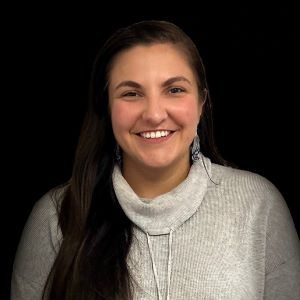
Kali Dale, PhD
Native Biodata Consortium, USA
Kali Dale is from Bemidji, MN, and a citizen of the White Earth Nation of Ojibwe Indians. She earned her doctorate in Oncological Sciences from the University of Utah in 2022 researching transcriptional regulation in cell growth signaling that is often mutated in several cancer types. Dr. Dale is a postdoctoral researcher at the Native BioData Consortium where she manages the laboratory with the first next-generation sequencer on a Tribal reservation. Her current areas of research are COVID-19 testing and sequencing, spatial transcriptomics, and Indigenous Data Sovereignty.
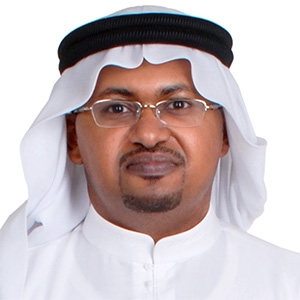
Osama El Hassan, MD, PhD
Dubai Health Authority, United Arab Emirates
Dr. Osama El Hassan is a co-founder and the vice-chair of Emirates Health Informatics Society. He serves as a Health Informatics Specialist at Dubai Health Authority to strategize and develop the digital health regulatory framework of Dubai. Dr. ElHassan is also the co-founder and the coordinator of the GCC Taskforce on Workforce Development in Digital Healthcare, which aims at empowering young local talents to enact eHealth roles through continuous training and rewarding career paths. He obtained a PhD in Informatics from University of Leicester and an MSc in Advanced Computing from Imperial College in UK. Dr. ElHassan research interests are eHealth workforce development, HIE and Information Governance.
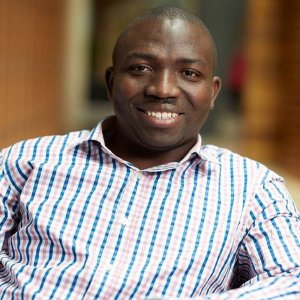
Segun Fatumo, PhD
The Medical Research Council, Uganda Virus Research Institute and London School of Hygiene & Tropical Medicine Uganda Research Unit, Uganda
Dr. Segun Fatumo is an Associate Professor of Genetic Epidemiology and Bioinformatics at the MRC/UVRI Uganda and London School of Hygiene and Tropical Medicine (LSHTM) in the UK. He leads The African Computational Genomics (TACG) Research group at the MRC/UVRI and LSHTM Uganda Research Unit. Dr Fatumo’s research broadly focuses on the genetic impact of non-communicable diseases in Africa, with particular interest in assessing the impact of genetic variation on kidney function, diabetes, lipid metabolism and a range of cardiovascular diseases. He leads major genomics programmes in Africa including the Uganda Genome Resource, Malawi Genome Resource and co-leads the Nigerian 100K Genomes Project.
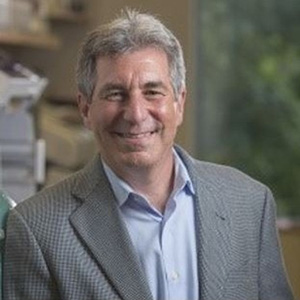
Geoffrey Ginsburg, MD, PhD
All of Us Research Program, National Institutes of Health, USA
Geoffrey Ginsburg, M.D., Ph.D., is the Chief Medical and Scientific Officer of the All of Us Research Program at the National Institutes of Health. He leads the Division of Medical and Scientific Research and is responsible for helping to set the scientific vision and strategy for the program. He also oversees the program’s collection and curation of data, and integration of new data types to support a wide range of impactful scientific discoveries. Prior to joining All of Us, Ginsburg was founding director for the Center for Applied Genomics & Precision Medicine in the Duke University School of Medicine where he pioneered translational genomics and the development of novel diagnostics. At Duke, he was professor of medicine, biostatistics and bioinformatics, pathology, and biomedical engineering. He also was a professor in the School of Nursing; he will remain adjunct professor of medicine. He has held senior leadership roles at Millennium Pharmaceuticals Inc. and was a member of the Harvard Medical School faculty.
Throughout his career, Ginsburg has demonstrated a strong commitment to interdisciplinary science and innovation, with work spanning oncology, infectious diseases, cardiovascular disease, and metabolic disorders. He has held leadership roles in the U.S. and internationally, serving as co-chair of the National Academies’ Roundtable on Genomic and Precision Health, a founding co-chair of the International HundredK+ Cohorts Consortium, and founder and president of the Global Genomic Medicine Collaborative (G2MC), a not-for-profit organization aimed at creating international partnerships to advance the implementation of precision medicine. At NIH, Ginsburg has served on the board of external experts for the National Heart, Lung, Blood Institute, as an advisory council member to the National Human Genome Research Institute and the National Centers for Advancing Translational Sciences, and most recently on the Advisory Committee of the Director of NIH.
He received his M.D. and Ph.D. in biophysics from Boston University and completed an internal medicine residency at Beth Israel Hospital in Boston. Subsequently, he pursued postdoctoral training in clinical cardiovascular medicine at Beth Israel Hospital and in molecular biology at Children’s Hospital as a Bugher Foundation Fellow of the American Heart Association.

Claudia Gonzaga-Jauregui, PhD
Universidad Nacional Autónoma de México (UNAM), México
Claudia Gonzaga-Jauregui is a Mexican human genetics and genomics researcher. She did studies in Genomic Sciences at the National Autonomous University of Mexico (UNAM). She obtained her PhD in Molecular and Human Genetics from Baylor College of Medicine, where she contributed to large population genomic studies such as HapMap 3 and pioneered the analyses of genomic sequence data for molecular diagnostics and the identification of novel Mendelian disease genes. She has led large-scale Mendelian genomics projects in academia and industry to identify medically relevant variations and potential drug targets. Claudia has now established her research group focused on Mendelian Genomics and Precision Health at the International Laboratory for Human Genome Research (Laboratorio Internacional de Investigación sobre el Genoma Humano, LIIGH) of UNAM in Mexico. Her research focuses on the investigation of human pathogenic and polymorphic genomic variation that contribute to human traits and diseases. Leveraging family-based analyses of rare and common genetic disorders and functional characterization of genomic variation, she aims to better understand disease mechanisms and pathophysiology. Claudia believes that the application and understanding of human genetics and genomics can lead to improved treatments and the realization of precision genomic medicine for everyone around the globe. She is an advocate for global genomic equity and diversity in genomics.
Twitter: @cgonzagaj
Mastodon: @cgonzagaj@genomic.social
Mendelian Genomics & Precision Health Laboratory
Red Mexicana de Enfermedades Raras (ReMexER)
ResearchGate
LinkedIn
Genomics of Rare Diseases: Understanding Disease Genetics Using Genomic Approaches
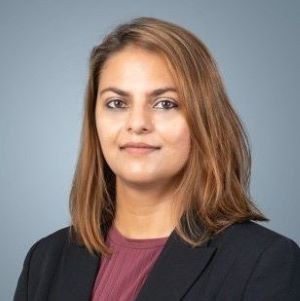
Pratiksha Gyawali, MD
Kathmandu University School of Medical Sciences, Nepal
Pratiksha Gyawali MBBS, MD (Nepal), Fellow Michigan Molecular Genetics Laboratory(MMGL) Josip Matovinovic, MD Endowed Clinical Medicine Fellowship
Dr Gyawali is a consultant biochemist at Dhulikhel Hospital and a Assistant Professor of Clinical Biochemistry at Kathmandu University, School of Medical Sciences, Nepal with experience and ongoing efforts to expand medical genetics services in Nepal. She received her MBBS from KUSMS, and MD from Institute of Medicine, Tribhuvan University. Dr. Gyawali also participated in the NIH’s Comprehensive Course in Human Genetics and Genomics in 2019 and since that time has also participated in the Global Genomic Medicine Consortium as an Early Career Investigator and part of the Family Health History Flagship Group. Dr. Gyawali is a founding member of the Nepal Society of Rare Diseases and serves as the Secretary of this newly formed group aimed at improving the diagnosis and care of patients in Nepal with genetic disorders.
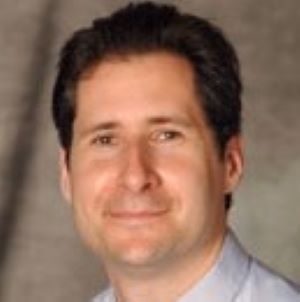
Richard L. Haspel, MD, PhD
Beth Israel Deaconess Medical Center and Harvard Medical School, USA
Richard L. Haspel, MD, PhD, FRCPath(Hon) is a Professor of Pathology at Beth Israel Deaconess Medical Center and Harvard Medical School. He is Co-Chair of the NHGRI Intersociety Coordinating Committee for Healthcare Provider Education in Genomics (ISCC-PEG). With the goals of identifying educational needs and potential solutions, sharing best practices in educational approaches and developing educational resources, ISCC-PEG membership includes over 260 representatives from societies, professional organizations, NIH institutes, industry as well as individuals with expertise in medical education. He has also developed, with NIH funding, genomics curricula for healthcare professionals.
National Human Genome Research Institute (NHGRI)
NHGRI Inter-Society Coordinating Committee for Practitioner Education in Genomics (ISCC-PEG)
NHGRI Educational Resources
Training Residents in Genomics (TRIG)
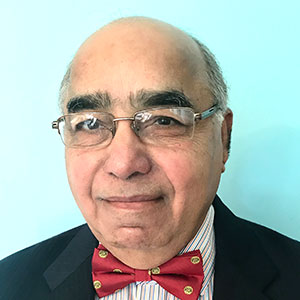
Dhavendra Kumar, MBBS, MD, DCH (RCPSI), MMedSci, PGCertMedEd, FRCPI, FRCP, FRCPCH, FACMG, DSc.(Hon); Honorary Clinical Professor
Queen Mary University of London, UK
St. Bart’s Hospital, Bart’s NHS Foundation Trust, London, UK
Cardiff Spire Hospital, Cardiff, Wales, UK
Apollo Group of Hospitals, India
Swansea University, Wales, UK
University of Colombo, Sri Lanka
Texas Tech University, Texas, USA
Professor Dhavendra is a highly acclaimed, globally acknowledged genetic and genomic clinician with special interests in clinical genetics and genomic medicine. He is credited with landmark contributions and achievements in genetic-inherited diseases of children, hereditary familial conditions of heart and blood vessels, applications of novel genomic principles and technology in genomic-precision medicine and public and population health genomics. He has authored/ edited many books in genetics/ genomics including the founding editor in chief of bio-medical journals and the series editor for the ‘Advances in Genetics’. Most recent book is entitled ‘Genomic Medicine Skills and Competencies’, part of the large series ‘Genomic and Precision Medicine in Clinical Practice.’
He is honoured with Doctor of Science, Honoris Causa by the alma mater, KGMU Lucknow, Hind Rattan International NRI Award, the GAPIO-Siemens Medical Innovation Award, the Glory of Georgians & Life Time Achievement Award of the KGMU Alumni UK, and the Life Time Achievement Award conferred by GAPIO (2023). He is widely applauded for his sincere and persistent efforts for medical genetics/ genomics across India and in other ‘low & middle income countries’. He founded the Global Consortium for Genomic Education (GC4GE) and Chairs the Human Genome Organization International (HUGO) Education Committee.
Twitter: @genomekumar
The Genomic Medicine Foundation (UK)
Bio: Queen Mary University of London
Books by Dhavendra Kumar
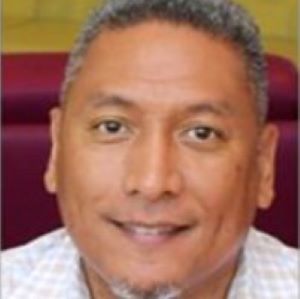
Lyndon J. Mitnaul, PhD
Regeneron Genetics Center, USA
Lyndon Mitnaul is an Executive Director in the Regeneron Genetics Center at Regeneron Pharmaceuticals, Inc., in Tarrytown, NY, where he establishes and manages multi-organization, large-scale human genetics research collaborations, and education and training initiatives focused on minority communities.
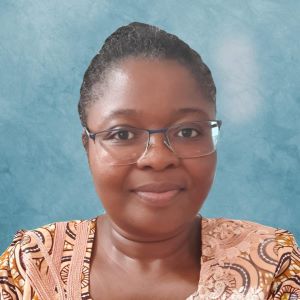
Vicky Nembaware, PhD
University of Cape Town, South Africa
Vicky is a Senior Lecturer at the University of Cape Town and a project manager for the Sickle Africa Data Coordinating Center. She is the current secretary of the African Society of Human Genetics. Vicky is passionate about translational research, capacity building, competency-based training and mentoring of the next generation of African researchers, health-care professionals and managers in human genetics and related fields. She was the 1st coordinator of the African Genomic Medicine Training initiative and mGenAfrica (a platform which promotes engagement between High School Learners and researchers in the Health Sciences field. She was also the 1st Training Coordinator for the H3Africa Consortium. Vicky has PhD in Bioinformatics and an MPhil Monitoring and Programme Monitoring and Evaluation, Vicky has research experience in Bioinformatics and in the Public Health field (particularly in mHealth).
Twitter: @VickyNembaware
LinkedIn
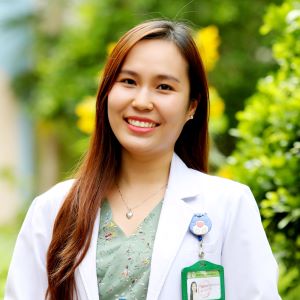
Trang Hoang Bao Pham, MD, MSc
Children’s Hospital 2, Vietnam
In 2020, Dr. Pham completed her residency in pediatrics and has since embarked on a fulfilling career as a pediatric neurologist at Children’s Hospital 2 in HCMC, Vietnam. Her passion for neuroscience drives her to continuously learn and explore different aspects of this field in various environments and countries. Dr. Pham believes that this diverse exposure to different perspectives and practices will greatly benefit her patients in Vietnam by allowing her to apply a more global approach to their care.
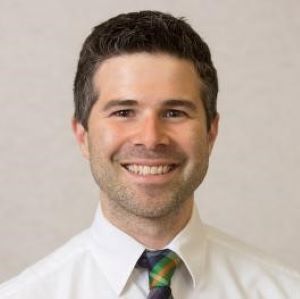
Shane Quinonez, MD
University of Michigan, USA
Shane Quinonez’s global work focuses on the expansion of medical genetic services throughout low and middle-income countries. Quinonez’s research utilizes mobile application development and deployment for data collection and focuses on the optimization of international medical electives to reduce the impact on the host country.
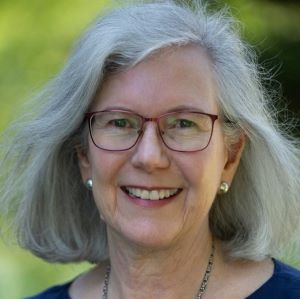
Michele Ramsay, PhD
Sydney Brenner Institute for Molecular Bioscience, University of the Witwatersrand, South Africa
Michèle Ramsay (PhD) is director of the Wits Sydney Brenner Institute for Molecular Bioscience (SBIMB), Professor in Human Genetics and South African Research Chair in Genomics and Bioinformatics of African Populations. Her research centres around the question of why some people are more susceptible to developing disease than others. She and her research group explore genetic variation in African populations and seek to understand gene-gene and gene-environment interactions that influence cardiometabolic disease risk. They collaborate extensively and contribute African data to global studies. The high genetic diversity and low linkage disequilibrium in the genomes of Africa populations, and the regional difference across Africa, make analyses complex and enhance the potential for novel discovery. The group explores the role of hunter-gatherer admixture and integrated risk models to understand the contributions of genetic and non-genetic factors to complex diseases and traits.
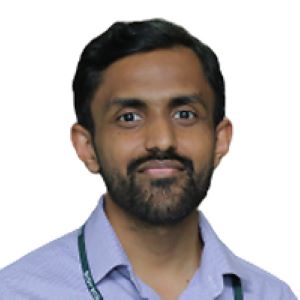
Vinod Scaria, MBBS, PhD
Vishwanath Cancer Care Foundation, India
Vinod Scaria is a clinician turned computational biologist with research interests in clinical and translational genomics. He is the co-founder of the Genomics for Understanding Rare Disease: India Alliance Network (GUaRDIAN). He has been part of collaborative genomics projects aimed at understanding the Indian and Asian Genome diversity. His work has unravelled the early insights into genetic disease epidemiology in the Middle Eastern populations and genomic resources widely used. He has also established one of the earliest fellowship programmes in genomics for clinicians in India.
Vinod did his undergraduate medical education at Calicut Medical College and PhD in Computational biology from the University of Pune. Vinod has over 200 research publications in international peer-reviewed journals and two books to his credit. He is a Kavli Frontiers of Science Fellow of the US National Academy of Sciences in 2015 and an elected Fellow of the Royal Society of Biology (2017) and the Royal Society of Public Health (2022).
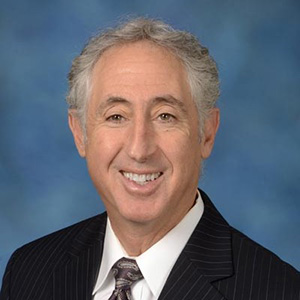
Alan Shuldiner, MD
Regeneron Pharmaceuticals, USA
University of Maryland, USA
Dr. Shuldiner founded and directs the Discovery Research Investigating Founder Population Traits (DRIFT) Program at the Regeneron Genetics Center. Their goals are to (i) catalogue population-specific allelic architecture; (ii) understand the biological and functional consequences of specific mutations identified; and (iii) share and establish best practice approaches to relieve disease burden in these populations. In his part-time role at the University of Maryland, Dr. Shuldiner is Associate Dean and Director of the Program for Personalized and Genomic Medicine whose mission is to is to advance discovery in genomics and other “omic” sciences. Dr. Shuldiner’s research applies high-throughput sequencing technologies to better understand human health and disease toward the identification and development of novel therapeutic targets and preventive therapies for diseases of unmet need. He also works to implement evidence-based genomic medicine and pharmacogenetics into patient care.
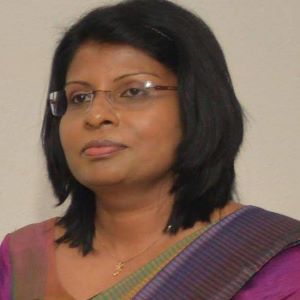
Prof. Nirmala D. Sirisena, MBBS, MSc, PhD
University of Colombo, Sri Lanka
Prof. Sirisena, is a Professor in Medical Genetics in the Department of Anatomy, Genetics and Biomedical Informatics, Faculty of Medicine, University of Colombo. Her special interests are Clinical Genetics, Cancer Genetics and Genomics, Genomic Medicine and Genomic Education. She provides clinical care and genetic counselling for patients with diverse genetic diseases attending the genetics clinic at the Centre for Genetics and Genomics. She is also involved in teaching medical genetics and genomics to both undergraduate and postgraduate students in the Faculty and co-ordinating research work related to both clinical genetics and cancer genomics. She spearheads the cancer genetics programme in the Centre and has been involved in integrating next-generation sequencing-based cancer gene panel testing to the repertoire of services offered through the clinic. She has presented her research work both locally and abroad and has authored numerous publications arising out of the Centre, which have won several awards.
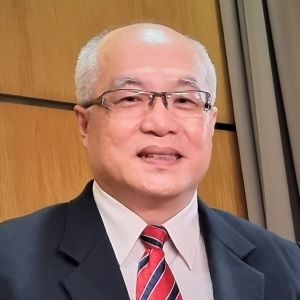
Meow-Keong Thong, MBBS, MD, FHGSA (Clinical Genetics)
University of Malaya, Malaysia
Professor Dr Meow-Keong Thong is a Professor of Paediatrics and Consultant Clinical Geneticist at the University of Malaya Medical Centre. He was a Fulbright Scholar and a board-certified clinical geneticist and established the first Genetics Clinic in Malaysia in 1995. He is the current President of the College of Paediatrics, Academy of Medicine of Malaysia, Vice-President of the Medical Genetics Society of Malaysia and Trustee, Rare Disease Alliance Foundation Malaysia. He was the recipient of the 2022 American Society of Human Genetics Advocacy Award and elected a steering committee member of the Global Genomic Medicine Collaborative (G2MC) in 2022. He was the past Head, Department of Paediatrics, University of Malaya and past President, Asia-Pacific Society of Human Genetics. He has authored over 110 WoS journal publications focusing on genetic diseases, 5 books, and 18 book chapters including the Oxford Monograph in Medical Genetics and a White Paper policy document entitled “Rare Diseases in Malaysia”.
Early Career Investigator (ECI) Presenters
Podium Presentations
- Ms Tsaone Tamuhla, South African National Bioinformatics Institute, University Of The Western Cape, South Africa “Implementation of a genotyped virtual African population cohort: A feasibility study in the Western Cape Province, South Africa”
- Ms Nirodhi Dasanayaka, University of Colombo, Sri Lanka “Differential expression of inflammatory-related genes in healthy long-term meditators: A case-control study”
- Dr Emma Magavern, Queen Mary University Of London, William Harvey Research Institute, UK “Engagement in a UK South-Asian ancestry community to support pharmacogenomics clinical implementation and research”
- Ms Caitlin Wheeler, University Of The Witwatersrand, South Africa “Impact of donor CYP3A5 genotype on pharmacokinetics of tacrolimus in South African paediatric liver transplant patients”
- Dr Hasani Hewavitharana, Ministry of health, Sri Lanka “Phenotypic and Genotypic Landscape of a Cohort of Sri Lankan Individuals with Inherited Kidney Disease (IKD)”
- Dr Zeina Al-mahayri, United Arab Emirates University, Abu Dhabi “Utilizing Population Pharmacogenomic Data for Priotorizing Drug Choice”
- Mrs Michelle Kamp, University of the Witwatersrand, South Africa “Developing an integrated risk score for cardiovascular disease for African populations”
- Dr Eduardo Pérez-Palma, Universidad Del Desarrollo, Chile “Analysis of Genomic Data in Chilean Pediatric Patients with Drug-Resistant Epilepsy”
- Ms Taylor Robinson, National Human Genome Research Institute, National Institutes of Health, USA “Advancing Genomic Literacy: Implementing an Interactive Family Health History Resource in At-Risk Communities”
- Dr Annette Uwineza, University Of Rwanda, Rwanda “Precision Medicine course for Medical Residents in Rwanda: assessment of knowledge and satisfaction”
Flash Talks
- Señora Arianne Llamos Paneque, Universidad Internacional Del Ecuador/Escuela De Odontologia, Ecuador “Molecular Diagnosis of Neurogenetic Diseases in Ecuador: Experience in a Third Level Care Hospital”
- Mr Arnab Ghosh, National Institute of Biomedical Genomics, India “Mapping the evolving dynamics of genomic and immune interactions during initiation and progression of oral squamous cell carcinoma from precancerous lesions”
- Dr Olfa Messaoud, Institut Pasteur De Tunis/University Tunis El Manar, Tunisia “Indirect Genotyping Techniques: a Valuable Tool for Limited-Resource Settings”
- Dr Reem Hamad, Institute Of Endemic Diseases, Sudan “Breast cancer and smell: Hints from epigenetic and functional alteration of the olfaction”
- Dr Youssef El Kadiri, National Institute Of Health of Rabat, Morocco “Genetic and Molecular Study of Congenital Myopathies and Congenital Muscular Dystrophies in Morocco”
- Ms Shathushika Arumainayaham, University Of Colombo, Sri Lanka “Designed and Implementation of a T-ARMS-PCR Assay to Genotype Genetic variants Associated with Retinoblastoma in a cohort of Sri Lankan Population”
- Mr Vincent Nyangwara, African Institute of Biomedical Science and Technology, Zimbabwe “Cardiotoxicity and pharmacogenetics of doxorubicin in black Zimbabwean breast cancer patients”
- Dr Micaela Barbieri Kennedy, University of Buenos Aires, Buenos Aires “Exome sequencing and an in-house bioinformatic pipeline as a diagnostic tool in pediatric epilepsy and other neurological disorders”
- Ms Pheziwe Mshunqwane, University Of Cape Town, South Africa “Genetics of Suicidality: Using Genetics to Understand the Relationship between Psychiatric Disorders and Suicidal Behaviour”
- Dr Vindya Subasinghe, Birmingham Women’s & Children’s Nhs Foundation Trust, UK “Phenotype-Genotype correlation of chromosome 22q11.2 deletion: clues for a better clinical suspicion in a resource limited setting”
- Ms Grace Larbie Gafa, Africa Kidney Disease Research Network/University Of Ghana Medical School, Ghana “Participants and Stakeholders views on feedback of Genetics Research Findings of the H3Africa Kidney Disease Research Network, Ghana”
- Dr Lilian Njagi, University Of Nairobi/Kenya Medical Research Institute, Kenya “Towards pharmacogenomics-guided tuberculosis (TB) therapy. N-acetyltransferase-2 genotypes among TB-infected Kenyans of mixed ethnicity”
- Ms Chantal De Long, Stellenbosch University, South Africa “Imatinib resistance: The role of pharmacogenetic variability in a South African chronic myeloid leukemia cohort “
- Ms Shareefa Isaacs, Stellenbosch University, South Africa “Variation in Diagnostic Requests and Outcomes for Hereditary Thrombophilia – Over Testing and Under Testing”
- Mrs Waruni Nawagamuwa, University Of Colombo, Sri Lanka “A study on genetic variants associated with Sarcoidosis in the Sri Lankan population”
Posters
- Dr Yasas D. Kolambage, Sabaragamuwa University of Sri Lanka, Sri Lanka “Unravelling the molecular basis of rare skeletal dysplasias using trio exome sequencing: A case series study”
- Dr Kawmadi Gunawardena, University of Colombo, Sri Lanka (2 posters) (1) “Genotypic spectrum of limb-girdle muscular dystrophy (LGMD) in Sri Lanka – Case Series” (2) “Sri Lankan experience of a low-cost genetic test for diagnosing mitochondrial disorders -Leber hereditary optic neuropathy (LHON) and Mitochondrial Encephalopathy, Lactic Acidosis, and Stroke-like episodes syndrome (MELAS)”
- Dr Rupesh Mishra, Civil Service Hospital, Nepal “Rare spastic paraplegia: First case report from Nepal”
- Ms Paidamoyo Farai Kachambwa, University Of Cape Town/Mediclinic Precise, South Africa “Exploring factors contributing towards competencies of medical sciences laboratory technicians and recommendations for plausible improvement: A case study of a Scientific Innovation Laboratory based in a resource constraint setting focusing on genomics.”
- Ms Mona-liza Sakyi, University Of Ghana, Ghana “The Effect of Polymorphism in BCL11A, APOL1 and Fetal Hemoglobin on Sickle Cell Phenotypes”
- Ms May Krause, University Of Cape Town, South Africa “Investigating KRAS and BRAF mutations as a means of distinguishing sporadic from hereditary forms of colorectal cancer”
- Ms Shareefa Isaacs, Stellenbosch University, South Africa “Screening and characterisation of BCR::ABL1 kinase domain mutations in Chronic Myeloid Leukaemia patients at Tygerberg Hospital – Secondary mutations, drug resistance and associated problems”
Conference Organizing Committee
Scientific Planning Committee
Marc Abramowicz (Switzerland)
Vajira Dissanayake (Sri Lanka)
Geoff Ginsburg (USA)
Rich Haspel (USA)
Theodora Katsila (Greece)
Bruce Korf (USA)
Rongling Li (USA)
Catalina Lopez (Canada)
George Patrinos (Greece)
Teji Rakhra-Burris (USA)
Juergen Reichardt (Australia)
Nirmala Sirisena (Sri Lanka)
MK Thong (Malaysia)
Grant Wood (USA)
Early Career Investigators (ECI) representatives:
Peter James Abad (Philippines)
Aradhana Dwivedi (India)
Pratiksha Gyawali (Nepal)
Annette Uwineza (Rwanda)
Logistic Planning Team
University Hospital of Geneva (HUG), Switzerland
Eva Hammar Bouveret
Marc Abramowicz
Sophie Longchamp
Rime Abla-Brandt
Symporg (event planner), Switzerland
Vanessa Mezzanotte
Bertrand Joehr
With the support of the G2MC Secretariat
THANK YOU TO OUR SPONSORS & PARTNERS!
Interested in being a sponsor for our next conference? Contact Us to learn more.





